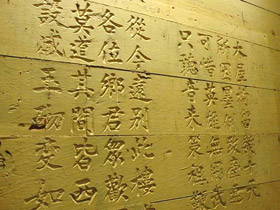
It was a bright sunny day in 2003 when my cousin Ronald and I took the ferry to Angel Island. Ronald was visiting from Flint, Michigan, and was curious about my newfound passion in poetry. I told him what I know about the Immigration Station on Angel Island, that between 1910-1940, many Chinese immigrants were detained on the island while their papers were being processed. Squalid conditions, humiliation, anxiety of deportation and hopelessness led to sickness and suicides. Desperate for an outlet, the detainees carved poems on the walls.
A short hike from the ferry dock led us to the Immigration Station. The lush vegetation, blue sky and bird songs were the making of paradise. I could not imagine suffering in such a pristine setting. We entered the living quarters. The floorboard and the walls seemed to be made of paper. Just things now, photos, information, artifacts…they did not stir me as I had expected to be stirred. And then I saw the poems on the walls. Most of them barely legible. But there they were, emerged from layers of old paint, reaching out, warning, reminding, retelling the inhuman treatment from one people to another. After three-quater of a century these words still carried a haunting vibration in the absence of their authors.
Ronald and I were quiet on our way back. Despite the gorgeous day, our hearts were heavy.

I had a friend, Raquel Ching, whose grandfather Dale spent time on the Island during the thirties. He was born and grew up in Daly City, but when he tried to reenter the USA after paying a visit to his family’s village in China, they wouldn’t let him back in until he could prove he wasn’t a paper son. Dale used to work as a docent at the Immigration Station. His was one of the most amazing tours you could take; he made it so personal. There is a great book, a bilingual edition, of the poems. I believe it’s called Island. Genny Lim did a large number of the translations.